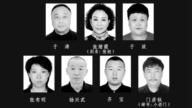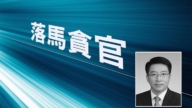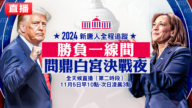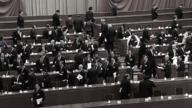【新唐人2013年08月02日訊】中共建軍日之前的31號,手握軍權不到一年的習近平再次晉升6名新上將。其中,一半是今年剛獲上將資歷即獲得提拔。這也是習近平擔任軍委主席以來,第2次晉升上將。港媒透露,習近平為鞏固軍權更是打破了以往的晉升慣例。分析認為,這顯示習近平已經掌控了北京軍區,鞏固了北京地盤,但目前中共面臨四面楚歌,即使習近平掌握了軍權,也無法挽回中共政權的頹勢。請看報導。
這六名中共新上將分別是總政治部副主任吳昌德、總裝備部政治委員王洪堯、軍事科學院政治委員孫思敬、北京軍區政治委員劉福連、南京軍區司令員蔡英挺、廣州軍區司令員徐粉林。其中吳昌德、王洪堯和蔡英挺今年才滿足晉升條件。但條件充足的瀋陽軍區政委褚益民卻落榜。晉升的條件是中將資歷4年,正大軍區職務2年。
原國務院研究中心研究員姚監複對香港《明報》表示,資歷剛滿足即獲提拔的軍官會對習近平更加忠誠,使他進一步鞏固軍權。姚監複還認為,軍權是否穩固,更是取決於總參謀部、總政治部、總後勤部、總裝備部四大總部,和各大軍區的一把手效忠於誰。
《明報》還透露,習近平在日前軍委的會議上宣佈,今後大軍區正職的提名權在他本人,別人一概不得提人選,大軍區副職也必須由他本人決定。這打破了江胡時代軍中人事由軍委高層或軍中元老提名建議的慣例。
其實,習近平在去年11月剛接任中共中央軍委主席後,立即授予新任二炮總司令魏鳳和上將軍銜,由於當時他尚未出任國家軍委主席,這一做法被外界稱為是「違憲」的破例行為﹔而去年原駐港司令張仕波發表堅決擁護習言論後,從候補委員升為中央委員,從駐港司令直升北京軍區司令,也是破例。
時事評論員藍述:「目前面對這樣一個非常尖銳的社會矛盾,中共急需要用軍隊來維持它統治的穩定性。很顯然,誰能掌握軍隊的絕對的領導權,那麼,誰在黨內的說話的聲音就會大。」
時事評論員藍述表示,習近平提升的6名上將中還有是江系背景的,這說明他在軍內還沒有樹立起絕對的權威,還需要搞派系平衡。
1954年生的蔡英挺是最年輕上將,他曾任原軍委副主席張萬年的秘書,而張萬年是江澤民的鐵桿嫡系。
北京時政觀察人士華頗卻表示,地位和榮譽是軍人的生命,習近平只要提升了他們,他們就會效忠,儘管他們可能來著不同陣營。但華頗也注意到,他們在晉升儀式上表現出了拘謹和緊張。
北京時政觀察人士華頗:「習近平給他們上將,給他們這麼大的恩典,使他們緊張,覺得不知道怎樣報答習近平﹔第二,有些人可能來自於不同的陣營,以前效忠過其他的人,這回改換門庭,要效忠習,怎麼對以前的老東家交帳。」
華頗指出,習上臺後,通過視察陸海空、二炮、武警部隊,加上晉升軍銜基本上控制了槍桿子,這次又晉升北京軍區政委,進一步鞏固了北京地盤。他可以用部隊為他推行新政保駕護航了。
華頗:「只有把北京地盤掌握了,才能以中央正統的地位號令全國。當初毛澤東發動文革,華國鋒粉碎『四人幫』都是首先掌握北京的部隊。」
藍述指出,面臨目前這麼尖銳的社會矛盾,這麼嚴重的黨內腐敗問題,中共一定會土崩瓦解,就像前蘇聯的巨變和當前的中東茉莉花革命一樣,與軍隊掌握誰的手上沒有太大關係。
採訪/易如 編輯/宋風 後製/陳建銘
Xi Jinping Promotes Six More Officers to Generals
On July 31, the eve of the Chinese Communist Party (CCP)
Army Day, Xi Jinping promoted six more officers to generals.
Three of the six new generals just became eligible
this year for promotion to the rank of general.
This is the second time that Xi, as head of Central Military
Commission (CMC), has promoted the army generals.
Hong Kong’s media reveals that Xi has broken with
tradition in promotion of military leaders.
Analysts say, this shows that Xi has gained overall control
of the Beijing Military Region and cemented his position.
Yet, in reality, the CCP has been mired in dire straits.
Analysts believe that Xi’s gaining of military power
cannot stop the CCP from going towards collapse.
The names of six new generals are as follows:
Wu Changde, deputy chief of the General Political Dept.
Wang Hongyao, political commissar of the
General Armament Dept,
Sun Sijing, political commissar of the Academy of
Military Sciences,
Liu Fulian, political commissar of Beijing Military Region.
Cai Yingting, Nanjing Military Region commander.
and Xu Fenlin, Guangzhou Military Region commander.
Wu Changde, Wang Hongyao, and Cai Yingting just
meet all promotion requirements this year.
Chu Yimin, political commissar of Shenyang Military Region,
meets the same criteria, however, failed in this promotion.
The criteria for promotion is 4-year service of Lieutenant
General, plus 2-year tenure as Military Region Leader.
Hong Kong’s Ming Pao quotes Yao Jianfu, a retired
researcher at State Council Research Center.
Yao says that the newly promoted officers who just met the
promotion requirements will be more loyal to Xi Jinping.
This will help Xi to further cement his control of the army.
Yao states that the security of military power depends
on the loyalty of the chief leaders of the four general
departments of the People’s Liberation Army(PLA).
Ming Pao reports at a recent military commission meeting,
Xi Jinping declared his exclusive right to appoint
Military Region leaders in the future.
The nomination is also for Military Region deputy chiefs.
This breaks with the precedent formed in era of
Jiang Zemin and Hu Jintao.
Based on the old rule, Military Region leaders were
nominated by CMC top levels or by old heads in the army.
In November 2012, Xi took over as the CMC chief.
He soon promoted Wei Fenghe, commander of
the 2nd Artillery Corps, to the grade of general.
Then Xi only served as the CCP’s CMC chief,
instead of national CMC chief.
His rank awarding was considered “unconstitutional".
Zhang Shibo, commander of the PLA Hong Kong garrison,
openly pledged his loyalty to Xi Jinping in 2012.
Afterwards, Zhang was promoted to the member of the
CCP Central Committee, from an alternate member.
He was named as Beijing Military Region commander.
Critic, Lan Shu: “Now in facing such a sharpening
of social conflict, the CCP is in dire need of the army to help maintain
its political rule.
Obviously, who has real control of the army is the one who
has bigger decision-making power in the CCP."
Lan Shu states that some of six new generals
were involved in Jiang’s faction.
This shows that Xi has not yet established
his absolute authority in the army.
Xi still needs to keep a balance among the CCP factions,
says Lan Shu.
The youngest general, Cai Yingting, was born in 1954.
Cai was once the secretary of Zhang Wannian,
former CMC vice chairman.
Zhang Wannian is known as a hardcore loyalist to
Jiang Zemin.
Beijing’s political observer, Hua Po, believes that
rank and honor is the life for an army man.
Those officers will show loyalty to Xi who has promoted
them, though they come from different factions.
They looked reserved and nervous at the rank
awarding ceremony, says Hua Po.
Hua Po: “Xi Jinping made them become generals,
which is a great honour.
This made them nervous, as they don’t yet known
how to repay Xi.
Secondly, some of them may come from different camps.
Now they want to switched to serve Xi, they feel
nervous on how to settle accounts with their old patron."
Hua Po believes that Xi has basically controlled the army
through his inspections and rank promotions.
Political commissar of the Beijing Military Region
is also on the latest promotion list.
This helps stabilize Xi’s turf in Beijing.
Hua Po remarks that Xi can be escorted by troops
on his path of new administration.
Hua Po: “By securing a control over Beijing makes
it possible for Xi to command the whole country.
On historical precedent, Mao Zedong controlled
Beijing troops before launching the Cultural Revolution.
So did Hua Guofeng for his defeat of the Gang of Four."
Lan Shu says that the CCP has been riddled with
sharp social contradiction and serious corruption.
This makes the CCP doomed to collapse.
The same thing happened in former Soviet Union and
in the Middle East uprising.
Lan Shu believes that these regime endings do not
have much to do with the control of the army.




























